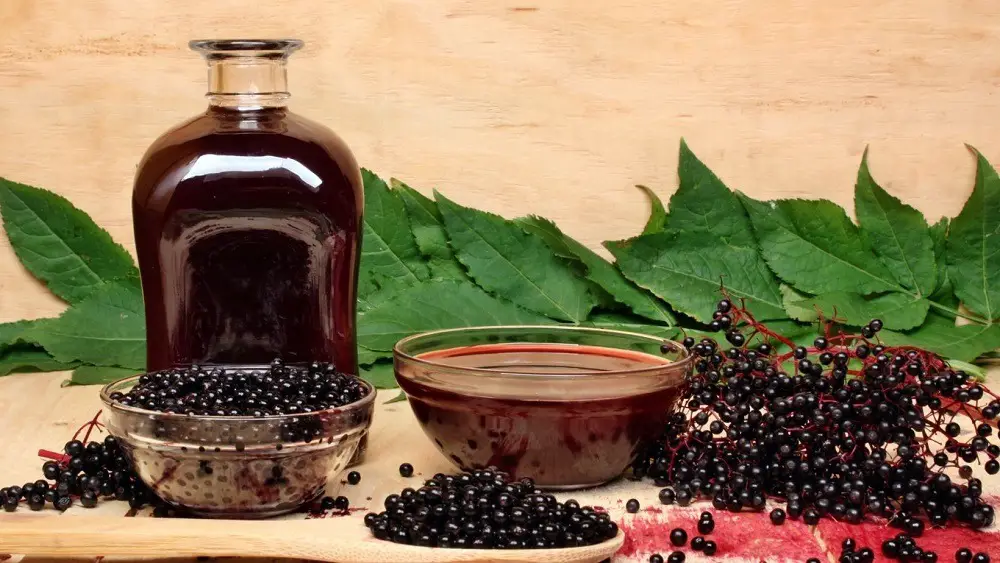Everything that we take into our bodies has an impact. A healthy, balanced diet will go a long way to strengthening your immune system, particularly if it is based around whole fruits and vegetables.
Elderberries are part of the herb world, which is another natural way to increase the action of your immune system. It has been used for thousands of years as a holistic medicine for a wide variety of health problems.

What is elderberry?
Elderberries come from different varieties of the Adoxaceae Sambucus tree. The most common of these is the European elderberry, also called black elder and Sambucus nigra. As the name suggests, the tree is native to Europe but grows across the world.
Other varieties of this tree include American elder, dwarf elder, blue elderberry, danewort, red-fruited elder, and antelope brush.
The tree can grow to be 30 feet tall. It flowers with small clusters of white or cream-colored flowers that are called elderflowers. The berries are found in bunches and are small and a dark blue hue. The raw berries are relatively sour and should be cooked before consumption. The flowers are delicate and can be eaten raw or cooked. Many people choose to make elderflower cordial using them.
What have elderberries been used for historically?
All different parts of the plant have been used throughout history for many different purposes. The flowers and leaves have long been consumed as a form of pain relief. They are believed to reduce swelling and inflammation, helping with injuries. As well as this, the leaves are a diuretic, meaning that they help to stimulate the production of urine and sweating.
The bark has been used as an emetic, diuretic, and laxative. This means that consuming the bark triggers vomiting, urination, and can help to relieve the symptoms of constipation.
The berries are either juiced or dried. The resultant product is then consumed as a treatment for infections, flu, headaches, and dental pain. The juice is also believed to help with sciatica, cardiovascular pain, and nerve pain. As with the other parts of the plant, the juice and berries can be consumed as a diuretic and laxative.
Elderberries are also commonly cooked and turned into jelly, chutneys, wine, and pies. As we have already mentioned, the flowers can be cooked into a sugar syrup to make a cordial to mix with water or into tea.
Nutrition
Elderberries are relatively low in calories but are jam-packed with nutritional benefits. They are high in Vitamin C and fiber. Per cup of berries, there are 52 mg of Vitamin C and 10 g of fiber. This comprises 57% and 36% of your recommended daily intake of each nutrient.
Elderberries are full of antioxidants. These are compounds that help to protect your body’s cells against the damaging effects of free radicals. It is believed that these are linked to cancerous growths in the body, therefore antioxidants are said to have some anti-cancerous effects. Elderberries are particularly high in phenolic acid which has strong anti-oxidative effects.
Other antioxidants in elderberries are the flavonols quercetin, kaempferol, and isorhamnetin. These are found in 10 times the quantities in the elderflowers.
The berries also contain anthocyanins, bioflavonoid compounds that give the dark blue hue. These have been reported to lower blood pressure, protect your cells against cancer, and reduce your diabetes risk.
Cold and flu alleviation
Extracts from the berries and flowers of these plants have been used as an effective treatment for colds and flu. It has been proven to speed up recovery time and make the symptoms less severe. As a result, you can now find many cold and flu treatments containing elderberry extracts.
Cardiovascular benefits
There is evidence to suggest that elderberries can reduce the fat content in your blood and reduce your cholesterol levels. The high flavonoid content of the berries has also been shown to reduce your overall risk of developing heart diseases.
It has also been shown that elderberry consumption can increase the secretion of insulin and control your blood sugar levels. This reduces the chances of developing type 2 diabetes, a major risk factor for heart disease.
Other reported benefits
There is some evidence to suggest that elderberries can inhibit bacterial growth in the stomach. In particular, it slows the growth of Helicobacter pylori. It can also be used to alleviate symptoms of bronchitis and sinusitis.
The polyphenols found in elderberries can also help to support the immune system. This is because it helps to increase the number of white blood cells in your body, helping to fight off infections.
There is circumstantial evidence to suggest that elderberries may protect your skin against UV radiation, like sunscreen. This must be applied topically to your skin to be effective.
There are reports to indicate that elderberry consumption could be linked to a reduction in depressive episodes.
Are there any health risks?
While there are many clear benefits to consuming elderberries, there are also some dangers. The raw berries, bark, and seeds of the tree all contain compounds that are known as lectins. If these are consumed in too high quantities you are likely to experience stomach and digestive problems.
The tree also contains cyanogenic glycosides. These are compounds that have the potential to release cyanide, like almonds and apricot seeds. In order to ingest a fatal dose, you would need to eat more than 3 kilos of leaves or berries. The cyanide in the berries and leaves will be removed during the cooking process.
If you consume uncooked berries, leaves, roots, or bark from the elderberry tree you will become unwell. Common symptoms include diarrhea, vomiting, and nausea. Other reported side effects are dizziness, numbness, weakness, and stupor.
It is not recommended that children under the age of 18 consume elderberry products. We also recommend avoiding elderberries if you are pregnant or lactating. This is not because negative effects have been observed, more so that there is not enough data to assure scientists of its safety.
